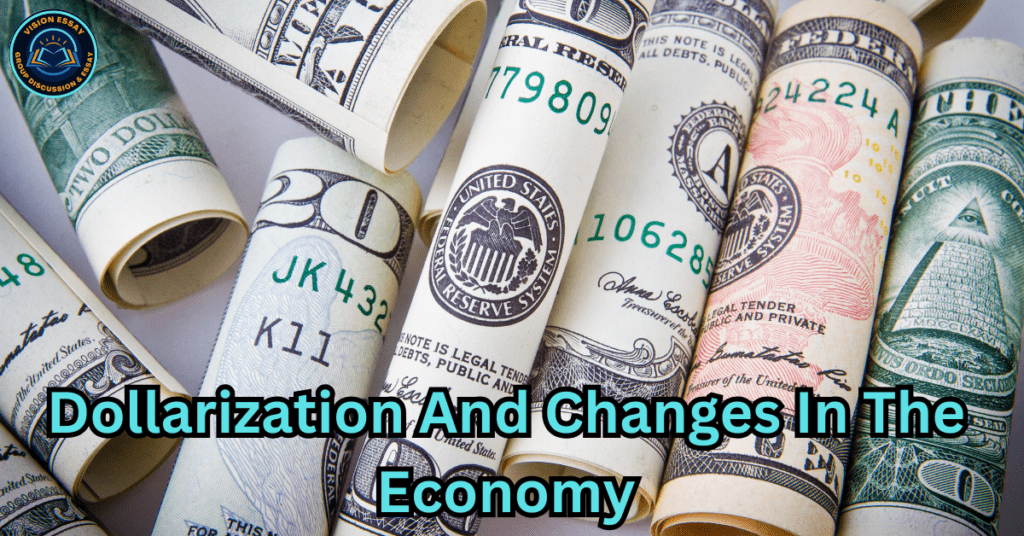
Introduction
Argentina, a country beset by extreme inflation and pervasive poverty, is at a turning point. There is hope that dollarization will help the nation’s economic problems. The newly elected Argentine president pledges to substitute the dollar for the Argentine peso. Nonetheless, given Argentina’s limited dollar reserves, the quick adoption of dollarization is improbable. The term “dollarization” refers to the use or acceptance of the US dollar as a nation’s main form of exchange, either completely replacing or complementing native currency.
How Dollarization Can Save an Economy?
- Stabilizing Inflation: By establishing a stable currency and ending the vicious cycle of rising prices driven by an unchecked money supply, dollarization may be able to stop hyperinflation. The economy is more confident as a result of this stabilization, which promotes investment and consumer spending.
- Enhanced Trade Opportunities: A dollarized economy encourages the development of export-oriented policies. A stable currency encourages overseas commerce by making foreign investors more likely to participate. This export-focused mindset can support stability and economic progress.
- Long-Term Planning: More stable dollar values facilitate improved long-term financial planning. Without the uncertainty of a declining home currency, businesses, both domestic and foreign, can make more precise projections and investments.
- Reduced Speculative Risks: Dollarization helps reduce the speculative risks brought on by exchange rate fluctuations. Due to their perception of lower risks, international investors may be drawn to this stability, which may eventually encourage capital inflow and economic growth.
- Financial Discipline: Dollarization pushes governments to depend more on fiscal than monetary measures to maintain economic stability. This change might lead to more cautious budgetary management, which could reduce government expenditure and foster economic restraint.
What are the Main Challenges in the Way of Dollarization?
- Policy Constraints
- The process of dollarization severely curtails a nation’s autonomy in monetary policy formulation.
- The ability of the government to respond to economic downturns may be hampered by a loss of control over the money supply and interest rates.
- Economic Shock Vulnerability:
- Dollarized economies may be more susceptible to foreign economic shocks when there is a fixed currency.
- They are not adaptable enough to quickly alter exchange rates to offset abrupt shifts in the world economy.
- Limited Export Competitiveness:
- The capacity of a nation to employ currency depreciation as a tactic to improve export competitiveness may be limited if control over the exchange rate is lost.
- Inability to Address Internal Imbalances:
- Dollarization might not solve the economy’s underlying structural problems.
- Reliance on foreign exchange could obscure the necessity of domestic reforms—such as raising income disparity or boosting productivity—that are essential for long-term economic growth.
What is De-Dollarization?
A country or region’s purposeful or inadvertent efforts to lessen its dependency on the US dollar in its financial system or economy are referred to as de-dollarization. To reduce the usage of the dollar in commerce, transactions, reserves, and as a benchmark for pricing products and services, many steps may be taken in this regard.
What are Strategies for De-dollarisation?
- It can involve creating currency swap agreements, supporting the use of regional currencies in financial operations, diversifying currency reserves, and pushing the use of other currencies in trade agreements.
- For example, the Reserve Bank of India (RBI) established a framework for the settlement of rupee trade with up to eighteen nations in March 2023.
- These nations’ banks are permitted to open Special Vostro Rupee Accounts (SVRAs) to accept payments in Indian Rupees.
Also Read: Globalizing the Indian Rupee in 2023
Experience of a Fully Dollarized Economy: Ecuador
- Ecuador’s path offers insightful information. The country had substantial economic growth after dollarization in 2000, despite early political unrest. The potential advantages of this action were demonstrated by decreased rates of inflation, decreased debt-to-income ratios, and enhanced social welfare.
- Nevertheless, dollarization was not the only factor in Ecuador’s success. Growing oil and gas reserves in the 2000s had a major role in driving economic expansion. Prosperity was also maintained by increased government investment in social programs and intervention.
Conclusion
Success in the economy may be achieved through dollarization in conjunction with strong domestic policy. Nevertheless, the effectiveness of this approach depends on the careful implementation of policy, weighing the benefits of stability against the requirement for autonomous economic plans.
Frequently Asked Question(FAQs)
How does dollarization affect the economy?
Dollarization might be advantageous or disadvantageous. Although it always leads to a loss of economic autonomy in monetary policy, it usually improves monetary and economic stability.
What are the advantages and disadvantages of dollarization?
Benefits for dollarizing nations include reduced interest rates, fewer administrative expenses, and a solid foundation for a more stable financial system. The loss of financial independence, seigniorage, and an important national emblem are drawbacks. Another is increased susceptibility to outside influence.
Why are countries dropping the U.S. dollar?
An increasing number of nations are making this endeavor to lessen the influence of the US dollar in global commerce. Several nations, including Brazil, Malaysia, China, India, and others, are attempting to establish trade routes with currencies other than the US dollar.
Is dollarization good for a country?
Having a stronger and more widely recognized currency to trade with is one of the biggest benefits of dollarization for smaller, less developed nations. Adopting dollarization entails a danger of losing sovereignty for poorer nations.
Sources:
